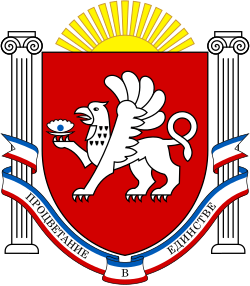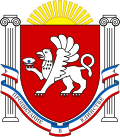State Council of Crimea
| |
|---|---|
 | |
| Type | |
| Type | |
| History | |
| Founded | 17 March 2014 |
| Preceded by | Supreme Council of Crimea |
| Leadership | |
| Structure | |
| Seats | 75 |
 | |
Political groups |
|
| Elections | |
Parallel voting:
| |
First election | 14 September 2014 |
Last election | 8 September 2024 |
Next election | 2029 |
| Meeting place | |
 | |
| Building of the State Council of Crimea, Simferopol | |
| Website | |
| www | |
| This article is part of a series on the politics and government of |
| Crimea |
|---|
 |
| Autonomous Republic of Crimea (within Ukraine, 1991–present) |
|
| Republic of Crimea (territory occupied by Russia 2014–present) |
| See also |
| Political status of Crimea Politics of Russia • Politics of Ukraine |
The State Council of Crimea [a] is the parliament of the Russia-administered Republic of Crimea. It claims to be a continuation of the 'Supreme Council of Crimea' [2] following a vote by the Ukrainian parliament to dissolve the Supreme Council of Crimea. [3] [4] [5] The Parliament is housed in the Parliament building in the centre of Simferopol.
Contents
- History
- 1998 to 2014
- In the wake of the Crimean crisis
- Factions
- Officers
- Composition
- 2014
- 2019
- See also
- Notes
- References
- External links
Following the events of 2014, Crimea is a territory currently under dispute between Russia and Ukraine with Russia administering the territory but most countries continuing to recognise the territory as Ukrainian.
During the period of time in which Crimea was controlled by Ukraine, the Parliament was unable to appoint the Prime Minister of Crimea on its own, being able to appoint him only with the advice and consent of the President of Ukraine. This restriction did not sit well with the Parliament and its constituents, creating a long-standing rift between them and the national government of Ukraine.[ citation needed ]
As the Crimean crisis unfolded, the Parliament building was seized by unidentified pro-Russian gunmen. Under their control, the Parliament removed the incumbent Ukrainian-consented Prime Minister of Crimea and unilaterally appointed Sergey Aksyonov in his stead. The disbandment was also caused by the belief that the Crimean Parliament collaborated with Russian troops in the region against Ukrainian authorities. [6] Days later,[ quantify ] the Crimean Parliament reunified its territorial jurisdiction with the city of Sevastopol into a single united nation and unilaterally declared their independence from Ukraine following a referendum. This newly formed nation then acceded to Russia which ultimately transferred the Crimean Parliament under a newly formed federal subject of Russia.